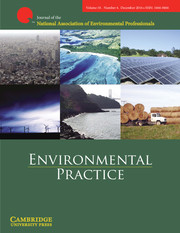Article contents
Commentary: The Clark Fork Settlement: Collaboration, Consensus, and Hydropower Project Relicensing
Published online by Cambridge University Press: 13 July 2009
Abstract
In 1993, in an attempt to avoid the traditional lengthy, costly, and often controversial process of relicensing hydropower projects, Avista Corporation initiated a novel collaborative approach that brought together a number of disparate actors to craft a consensus relicensing application. The company's interest in a cooperative settlement was driven by continuing changes in the economic, political, and regulatory environment of relicensing. Over the last three decades various regulatory actors have placed a greater emphasis on environmental protection, increased competition in the electricity industry, and opened the relicensing process to new participants. There were three primary issues in the settlement discussions: the level of funding Avista would commit to environmental mitigation, species protection and habitat restoration, and the future operation of hydropower projects. The negotiated settlement provides the company with a degree of cost and regulatory certainty, while environmental organizations and government wildlife agencies gain an accelerated time-frame for mitigation and protection activities and a secure funding commitment. The Clark Fork settlement is evidence that negotiated compromises to relicensing applications may in certain circumstances become an effective means to balance economic and environmental values.
- Type
- Features & Reviews
- Information
- Copyright
- Copyright © National Association of Environmental Professionals 2000
References
- 3
- Cited by


